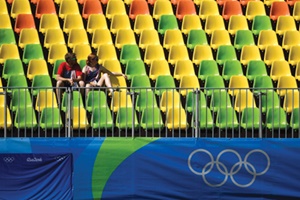 |
Empty seats have been an issue during the Games.
Getty Images
|
Eleven percent of ticket buyers to Rio Olympic events didn’t use their tickets, according to preliminary figures provided by local organizing committee spokesman Mario Andrada today.
He said also a social program designed to educate local Rio school children on “Olympic values” by introducing them to sports fell flat. More than half, 55 percent, of 280,000 free tickets given to kids weren’t used, mostly because they’re on winter vacation and had no easy way to get to the venues.
Winter vacation in Brazil usually comes in July but was moved to August to alleviate traffic this year.
“The reason in this case is the fact the kids were on holiday so there was not a central point like a school where they could go to have transportation,” Andrada said. “We kind of left this to each family, and some cases to [a charity]. We fixed most of it as soon as we realized that the social program was not showing on TV. We fixed some of this, but at this point 55 percent of those who got free tickets in the social program did not show up.”
Another wrinkle mentioned by Andrada: Among people who bought walk-up tickets outside Barra Olympic Park, 7 percent did not make it into the specific venue. That lends credence to organizers’ theory that some people bought tickets only to see the park, not the sports.
Empty seats have been one of the big talking points of the Rio Games, because the sparse attendance has been seemingly at odds with reports of ticket sales approaching 90 percent of the total inventory of nearly 6 million. Andrada denied that Rio 2016 had refused to buy back tickets distributed years ago to foreign Olympic committees, which also count as sold seats whether or not an end user ultimately takes advantage.




